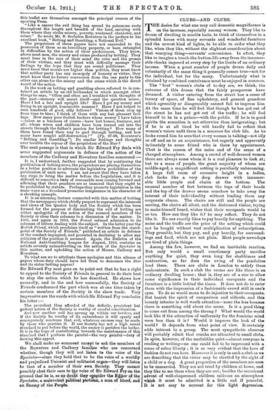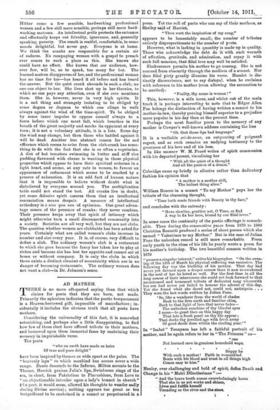CLUBS—AND CLUBS.
THE desire for what one may call domestic magnificence is on the increase, especially among women. They like to dream of dwelling in marble halls, to think of themselves in a.
splendid house with many servants and wonderful furniture and the newest kind of lights, to be able to order what they like, when they like, without the slightest consideration about that wearying thing—servants' convenience. In effort, they like to imagine a touch-the-button-life away from the innumer- able checks imposed at every dap by the limits of an ordinary income. When a great number of people dream daily and voluntarily of the same thing it generally comes true—not for the individual, but for the many. Unfortunately what is obtained by combined contrivance must be enjoyed in common. The " best " women's clubs of to-day are, we think, the outcome of this dream that the fairly prosperous have dreamed. A visitor entering from the street has a sense of luxury of space, of fine upholstery, and general grandeur which agreeably or disagreeably cannot fail to impress him At the same time he will feel that though he has got out of the street he has not got out of the traffic ; he will feel himself to be in a palace—with the public. If he is in good spirits the sensation is not otherwise than invigorating; but if he is at all tired he will hardly fail to reflect that women's voices unfit them in a measure for club life. As he looks round him he sees that every woman is talking—not idly or off and on to an acquaintance, but eagerly and apparently intimately to some friend who is there by appointment. That is the reason of the noise and of the sense of a charged atmosphere. Among a crowd of well-dressed women
there are always some whom it is a real pleasure to look at; but to a mass of people, the great majority of whom are
middle-aged, a magnificent setting is peculiarly unbecoming.
A large full room of excessive height in a ladies, club looks like a very deep drawer with innumer- able little people and chairs at the bottom. The unusual number of feet between the tops of their heads and the top of the drawer seems somehow to take away the interest of their individuality without lending them any corporate charm. The chairs are still and the people are moving, the chairs all silent, and the distressed visitor, trying to make himself heard, wishes that their occupants would be
so too. How can they like it ? he may reflect. They do not like it. No one exactly likes to pay heavily for anything. The
noise and the traffic are the price of the setting which could not be bought without vast multiplication of subscriptions. They grumble, but they pay, and pay heavily, for surround- ings and food, which are not plain. Most people nowadays are tired of plain things.
Among the few, however, we find an inevitable reaction. Not only would a small reactionary party sacrifice anything for quiet, they even long for shabbiness and contraction, so far does the swing of the pendulum lead them. There are clubs in London to satisfy these malcontents. In such a club the rooms are like those in an ordinary dwelling house ; that is, they are of a size to allow some significance to their individual occupants and the furniture is a little behind the times. It does not do to enter them with the impression of a fashionable crowd still in one's eyes. To do so would mean to do injustice to their occupants. But banish the spirit of comparison and ridicule, and this homely interior is well worth attention—none the less because there is something odd about the scene. Is it a good thing to come out from among the throng P What would the world look like if the attraction of uniformity for the feminine mind were less than it is ? Would it improve the look of the world ? It depends from what point of view. It certainly adds interest to a group. The most sympathetic observer will probably admit that cranks are attracted to small clubs. In spite, however, of the unclublike quiet—almost everyone is
reading or writing—no one could fail to be impressed with a sense of sober liberty ; it is so very evident that the laws of fashion do not run here. Moreover it is only in such a club as we are describing that the vistor may be startled by the sight of a child or a dog. A great proportion of the members are suns to be unmarried. They are not tried by children at home, and they like to see them when they are out; besides the occasional advent of well-chaperoned children enlivens an atmosphere whisk it must be admitted is a little sad if peaceful. It is not easy to account for this light depression. Hither come a few sensible, hardworking professional women and a few still more sensible, perhaps still more hard- working matrons. An intellectual grille protects the entrance and effectually keeps out frivolity, ignorance, and, generally speaking, poverty. The result is restful, comfortable, in some moods delightful, but never gay. Everyone is at home. We think the cranks are responsible for a certain air of sadness. No rampaging woman with a gospel to preach ever comes to such a place as this. She knows she could have no effect. She knows that aer audience, how- ever few, will be, so to speak, too many for her. The learned matron disapproves of her, and the professional woman has no time for her—has heard it all before and has heard the answer. But the quiet crank abounds in such a club; no one can object to her. She lives shut up in her theories, to which no one pays any attention, even if she ever mentions them. She is, however, never in very high spirits. It is a sad thing and strangely isolating to be obliged by some dogma or dogmas to which one clings to walk always against the wind of the time-spirit. To be obliged by some inner impulse to oppose oneself always to a force before which one must fall, which breathes in the breath of the great majority and mocks its opponent at every turn; it is not a voluntary attitude, it is a fate. Some day the wind may change, but then those who battled against it will be dead. Another less abstract reason for the sad effluence which seems to arise from the club-crank has some- thing to do with the fact that she is so often a vegetarian. A diet of hot tomatoes swimming in butter and stiff rice pudding flavoured with cheese is wanting in those physical properties which appear to have their spiritual outcome in a light heart, and seems, at any rate in women, to favour an appearance of refinement which seems to be reached by a process of exhaustion. It is an odd fact of human nature that it is impossible to believe without doubt what is disbelieved by everyone around you. The multiplication table could not stand the test. All cranks live in doubt, yet some delusive spirit assures them that an intellectual renunciation means despair. A measure of intellectual orthodoxy is a sine qua non of optimism. One great advan- tage comes of the presence of cranks : they never combine. Their presence keeps away that spirit of intimacy which might otherwise turn a small disconnected community into a society. Societies are all very well, but they are not clubs. The question whether women are clubbable has been asked for years. Certainly what are called women's clubs increase in number and size every year. It is, of course, very difficult to define a club. The ordinary women's club is a restaurant to which she goes because the fancy has taken her to play at riches and because she has lost her appetite and cannot eat at home or without company. It is only the clubs in which there exists a distinct element of eccentricity which are in no danger of becoming restaurants. The ordinary woman does not want a club—in Dr. Johnson's sense.



















































 Previous page
Previous page